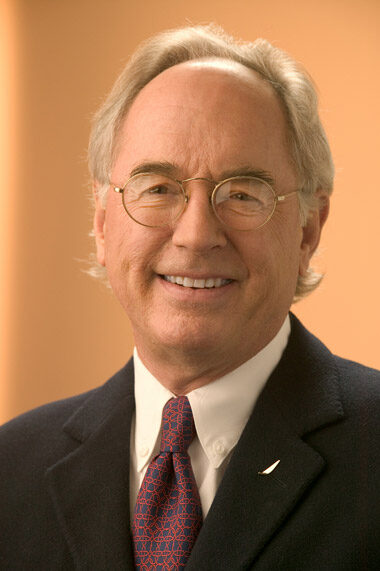Joseph Clark*
Class of 2008
- Chairman Aviation Partners Boeing
- Chairman & CEO Aviation Partners Inc.

Tap into the inner drive that is born from diversity, and persevere through your mistakes.
Joseph Clark was born in Calgary, Alberta, Canada, in 1941. Soon after, his family moved to a small home in Seattle, Washington. Clark's mother was deaf and could hear only with the aid of sophisticated hearing instruments, and his father was a lifelong stutterer. Their resources were always limited, and the Clark family lost everything in the Great Depression. The challenges they faced continued as they raised their own children. As a child, Clark struggled academically, but his grades improved after a relative provided funding for him to attend a private school. Clark credited his early childhood experiences with teaching him how to persevere and succeed on his own.
In his early 20s, Clark discovered aviation, which developed into a lifelong passion. He became more focused and centered as he worked diligently to establish a career in aviation. In 1966, he founded Jet Air, the first Lear jet distributorship in the Pacific Northwest. Jet Air's sales territory covered Washington, Oregon, Alaska, and all of Canada. His next career move was to Raisbeck Engineering, Inc., where he became vice president of sales. In 1981, he partnered with Milt Koult to form Horizon Air, a highly successful, Seattle-based regional airline that was eventually sold to Alaska Airlines.
In 1987, he founded Avstar, Inc., to market ex-military jet training aircraft to U.S. companies and private individuals. The following year, Clark, along with partners Clay Lacy and Bruce McCaw, formed the Friendship Foundation to raise money for charity and to set a record for global flight. On January 28-29, 1988, using a Boeing 747SP, the Friendship Foundation achieved that goal by circling the planet in 36 hours, 54 minutes, and 15 seconds. Their achievement raised more than $500,000 for children's charities.
In 1991, Joe Clark and Dennis R. Washington, chairman emeritus of the Horatio Alger Association, founded Aviation Partners, Inc. (API). Its 40-member staff, consisting mainly of retired Boeing and Lockheed engineers, invented blended winglets, metal extensions that are bolted to the ends of an airplane's wings. The tips curve upward and help reduce drag and add lift, thereby maximizing fuel efficiency. Clark estimated that over a seven-year period, his winglets saved the airline industry more than 350 million gallons of jet fuel, a figure likely to increase as more airlines use this technology.
Initially, the winglets were designed to fit Gulfstream II jets, but they were later custom-fitted to all types of airplanes and jets. At the 1999 Paris Air Show, Clark signed an agreement with The Boeing Company to retrofit all 10,200 Boeing aircraft then in use. This change could save nearly 1.8 billion gallons of jet fuel per year, Clark said, with corresponding reductions in engine emissions. In addition to working with Boeing, API has developed blended winglets for the Raytheon Hawker 800 series and Dassualt Aviation's Falcon 2000 LX. The winglets for this latter aircraft required additional technological advances to be effective at Mach speeds.
The March 2006 issue of Airport Journal includes Clark among its "Living Legends of Aviation", men and women it defined as having the "ability to fly beyond the boundaries." The article noted that legends of aviation "inspire us to fly beyond our own limiting boundaries. When we see proof that extraordinary things are possible, and that it's as simple as reaching beyond ourselves, we are then free to fly to new heights ourselves." The Horatio Alger Association was proud to welcome Clark as a role model who demonstrated what those with determination and vision can achieve.
